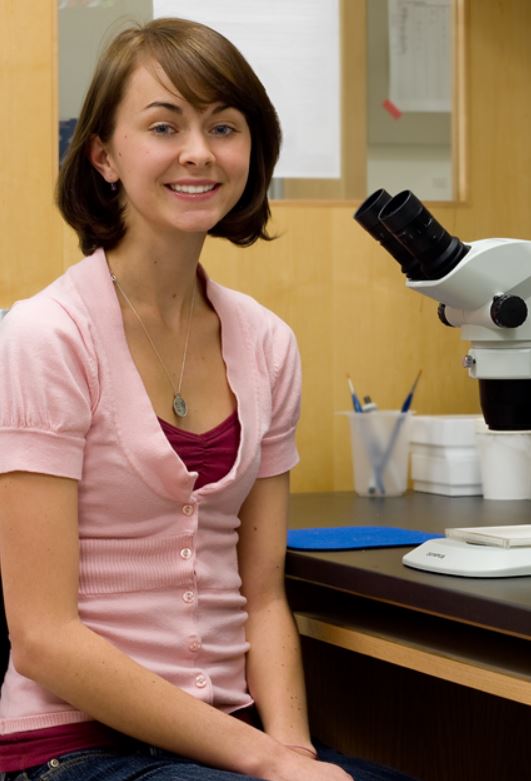Meet Dr. Sjogren!
As an undergraduate student, I often meet people and think, “This is who I want to be when I grow up.” When I first logged on to my interview with Dr. Carly Sjogren, I knew she would be one of those people.
Before Dr. Sjogren was the plant research extraordinaire that she is today, she was an undergraduate at UC Riverside who was barely aware that research was an option for her. “I worked at this mom and pop restaurant,” she said, “and every week this big group would come in that would put a pebble in the cog, and just throw off the workflow.” As a waitress, she always took charge of the situation to make sure it didn’t mess anything up too much. But one day, as she was walking across campus between classes, she saw one of the men in the group walking toward her. And he recognized her.
“He thought I was the restaurant owner,” she recalled, because she worked hard and seemed to know everything about the restaurant. And then he offered her a research spot in his lab. “I didn’t really know what undergraduate research was, or even just what graduate school was, and I’m so grateful that someone pulled me through the door,” she said. That interaction has stuck with her, because “I didn’t even know how science worked on campus. But he gave me an opportunity just because of my work ethic and interest in science.”
While she was in that lab, she worked on fruit fly research, but she eventually transferred to a lab more related to her interest in plant biology. She even completed her PhD in the same lab. “I fell in love with the [research] question,” she said. Her work there involved looking at aluminum toxicity in plants and how it affects the roots. Because roots are underground, hidden, “it seemed like a huge mystery to me,” she said.

On top of research, though, she also started teaching while completing her PhD. “My program required us to teach two semesters, but I ended up teaching for ten,” she said. Each time, she was able to teach a different course, which allowed her to have a range of teaching experiences. When she first started teaching, she was really nervous for the first week or so. “Eventually, I figured out that it’s more about the students than me,” she said. “Putting the emphasis on making the classroom a space for students to learn really helped me.”
When I asked her about how she sees her ideal balance between mentorship and research, she said that she likes getting to combine the two. “I see getting to train students to be researchers as much more fulfilling” than either of the two on their own, she said. Being able to blend these two passions is what ultimately drew her to NC State’s Biotechnology Program. Even while completing her PhD, being able to have a combination of research and teaching helped her in ways she didn’t fully realize at the time. “I didn’t know until it got taken away that doing both made me better at each of my jobs,” she said, “even if only because I had to work hard to manage my time.”
Unsurprisingly, based on the way she got her start in undergraduate research, Dr. Sjogren advises undergraduates to “just try something.” As an undergraduate myself, I often feel as though every decision I make will have massive consequences for the path my life takes, even though I’ve only just gotten my start in the world of science. So it’s nice to have a reminder that your undergraduate years are not the “end all, be all” that they are often presented as. She also thinks that it’s important for students to think about their careers in terms of “what problems do I want to solve?” instead of “what do I want to be?” It’s important to think about how what you’re learning can be applied to “questions that motivate us to find answers.” In her own words, “That’s a recipe for a fulfilling career!”
Though she will eventually design her own course, as the rest of the faculty in the Biotechnology Program do, Dr. Sjogren is starting out by teaching a section of BIT 410/510. “I really love learning new things, and I hope that I can instill that into others,” she said. She will also continue to conduct research as a continuation from both her graduate work and the work she did in her first postdoctoral position, though she will be transitioning to focus on crops, instead of the model plant Arabidopsis. This is particularly exciting because “I’ve been interested in focusing on crops since I started plant research.” And as a mentor for the 2021 BIT SURE program, she will be taking on a summer student to mentor on their research journey. The ability to blend two of her passions is why joining the Biotechnology Program was, to her, “a dream opportunity.”
- Categories: